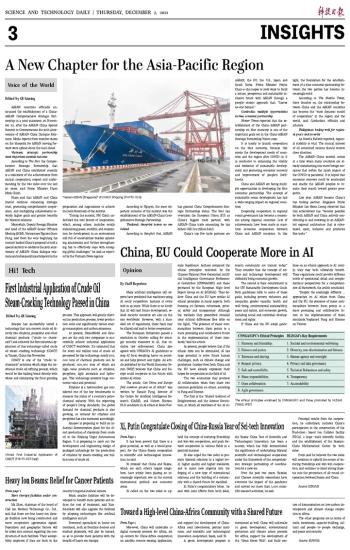
 A New Chapter for the Asia-Pacific Region
A New Chapter for the Asia-Pacific Region China, EU Could Cooperate More in AI
China, EU Could Cooperate More in AI First Industrial Application of Crude Oil Steam-Cracking Technology Passed in China
First Industrial Application of Crude Oil Steam-Cracking Technology Passed in China Xi, Putin Congratulate Closing of China-Russia Year of Sci-tech Innovation
Xi, Putin Congratulate Closing of China-Russia Year of Sci-tech Innovation Heavy Ion Beams: Relief for Cancer Patients
Heavy Ion Beams: Relief for Cancer Patients Toward a High-level China-Africa Community with a Shared Future
Toward a High-level China-Africa Community with a Shared Future
 |
| The ethical principles endorsed by CNNGAIGPC and those promoted by HLEGAI. (TABLE: WEF) |
Many artificial intelligence (AI) experts have predicted that machines using AI could outperform humans at every task in 45 years. While there is no doubt that AI will lead future development, related security concerns are also on the rise worldwide. However, with a standard set of regulations, these fears may be allayed and lead to better cooperation.
The European Parliament passed a resolution in October calling for stronger security measures in AI, that includes law enforcement. China also agreed with UNESCO's AI guidelines to stop AI from wreaking havoc on societies and help protect user rights. An article published by the World Economic Forum (WEF) believes that China and Europe could cooperate in the future with similar AI ethics.
The article, Can China and Europe find common ground on AI ethics? was written by Pascale Fung, director of the Centre for Artificial Intelligence Research (CAiRE), and Hubert Etienne, Ph.D candidate in AI ethics at Ecole Normale Supérieure. Authors compared the ethical principles endorsed by the Chinese National New Generation Artificial Intelligence Governance Professional Committee (CNNGAIGPC) and those promoted by the European High-level Expert Group on AI (HLEGAI). They believe China and the EU have similar AI ethical principles in many aspects, both focusing on fairness, robustness, privacy, safety and transparency. Although the methods they prescribed revealed clear cultural differences (See table on the right), "The presence of major commonalities between them points to a more promising and collaborative future in the implementation of these standards,"said the article.
At present, people believe that if the ethical risks can be eliminated, AI has huge potential to solve future human challenges, such as climate change and pandemics. Leaders from both China and the EU have already expressed their hopes for cooperation in the field of AI.
The two economies may promote AI collaboration when they share two common guidelines on ethics, according to Fung and Etienne.
The first is the "shared tradition of Enlightenment and the Science Revolution, in which all members of the AI research community are trained today." They consider that the concept of science and technology development will definitely bring economic growth.
The second is their commitment to the UN Sustainable Development Goals. Both guidelines refer to some of these goals, including poverty reduction and inequality, gender equality, health and well-being, environmental sustainability, peace and justice, and economic growth, including social and individual development and rights.
If China and the EU adopt guidelines on an ethical approach to AI jointly, they may both ultimately benefit. Their regulations could provide different levels of operational detail and complementary perspectives for a comprehensive AI framework, the article concluded.
"Despite the seemingly different … approaches on AI ethics from China and the EU, the presence of major commonalities between them points to a more promising and collaborative future in the implementation of these standards,"explained Fung and Etienne on Twitter.


 Next
Next



